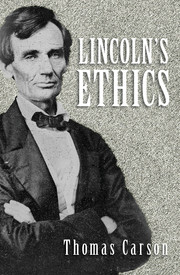Book contents
- Frontmatter
- Dedication
- Epigraph
- Contents
- Detailed Contents
- List of Maps and Figures
- Acknowledgments
- How This Book Came to Be
- 1 Introduction
- PART ONE LINCOLN THE POLITICIAN AND COMMANDER IN CHIEF
- 2 Lincoln's Evolving Policies Regarding Slavery: Compromise and Utilitarianism
- 3 Habeas Corpus, Colonization, and the Status and Rights of Free African Americans
- 4 Did the Union Have Just Cause for Fighting the American Civil War?
- 5 Jus in Bello: Did the Union Fight the War Justly?
- 6 Moral Luck and Lincoln's Good Moral Luck
- PART TWO LINCOLN'S MORAL CHARACTER
- Bibliography
- Index
- Plate Section
3 - Habeas Corpus, Colonization, and the Status and Rights of Free African Americans
from PART ONE - LINCOLN THE POLITICIAN AND COMMANDER IN CHIEF
Published online by Cambridge University Press: 05 May 2015
- Frontmatter
- Dedication
- Epigraph
- Contents
- Detailed Contents
- List of Maps and Figures
- Acknowledgments
- How This Book Came to Be
- 1 Introduction
- PART ONE LINCOLN THE POLITICIAN AND COMMANDER IN CHIEF
- 2 Lincoln's Evolving Policies Regarding Slavery: Compromise and Utilitarianism
- 3 Habeas Corpus, Colonization, and the Status and Rights of Free African Americans
- 4 Did the Union Have Just Cause for Fighting the American Civil War?
- 5 Jus in Bello: Did the Union Fight the War Justly?
- 6 Moral Luck and Lincoln's Good Moral Luck
- PART TWO LINCOLN'S MORAL CHARACTER
- Bibliography
- Index
- Plate Section
Summary
This chapter addresses five of Lincoln's most controversial and morally questionable actions and policies.
I. Lincoln's Suspension of Habeas Corpus
The principle of habeas corpus stated in the U.S. Constitution requires that people who are held in jail be charged with a crime or else released. It forbids the government from imprisoning people indefinitely without charging them with a crime. Article One, Section 9 of the Constitution says that “[t]he privilege of the writ of habeas corpus shall not be suspended, unless when in cases of rebellion or invasion the public safety may require it.” Lincoln suspended the writ of habeas corpus during the Civil War, causing thousands of people to be imprisoned without due process of law. Some argue that this suspension was unconstitutional and that Lincoln acted wrongly and greatly abused and exceeded the powers of his office.
What Lincoln Did
Very early in the Civil War, in April 1861, he suspended the writ of habeas corpus between Philadelphia and Washington, D.C. He did this in response to the actions of Confederate sympathizers in Maryland who attacked Union troops passing through Baltimore, tore down telegraph wires, and burned railroad bridges linking the capital with the North. Several months later, in September 1861, a special session of the Maryland legislature was called to consider voting for secession. James McPherson describes Lincoln's response:
Lincoln decided to take drastic action. Union troops sealed off Frederick (where the legislature was meeting) and arrested thirty- one secessionist members along with numerous other suspected accessories to the plot, including Mayor George Brown of Baltimore. All were imprisoned for at least two months, until after the election of a new legislature in November.
On October 14, 1861, Lincoln extended the suspension of habeas corpus to the entire Eastern Seaboard from Washington, D.C., to Bangor, Maine.
- Type
- Chapter
- Information
- Lincoln's Ethics , pp. 86 - 122Publisher: Cambridge University PressPrint publication year: 2015

